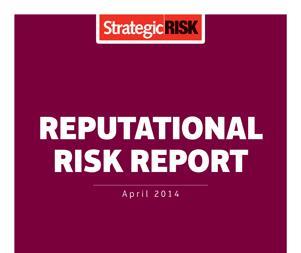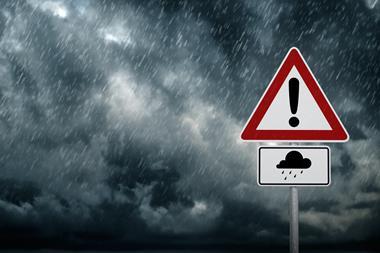About 95% of corporations have suffered a major reputation crisis in the past 20 years, according to Willis, but adoption of reputation cover has been sluggish

When a company’s name becomes tarnished – the chief executive is caught up in a scandal, an environmental disaster occurs or a company’s records are compromised – revenue falls, the stock price slides and the acquisition of new customers slows.
It’s a scenario that has played out many times: the BP Deepwater Horizon oil spill in 2010 (pictured), the Sony PlayStation loss of 77 million users’ data and, in July, the Asiana Airlines plane crash in San Francisco that left three people dead.
A staggering 95% of large corporations have suffered at least one major reputation crisis in the past 20 years, according to global broker Willis.
Strategy issues
“About 50% of the events we researched had to do with problems with the company’s business strategy or model; 15% were from lawsuits; and 10% were related to merger and acquisition problems. Notably, until 2011, natural catastrophes were not a factor in their reputation crises,” says Willis Structured Risk Solutions chief executive Phillip Ellis.
But would any of these major corporations hit by a crisis have been better placed to deal with their losses if they were insured for reputation damage?
A reputation consultant, who preferred to remain anonymous, said BP was thought to have had a reputation insurance policy of $100m (75.4m) for a $5m premium. But that counts for little when its losses in the Deepwater Horizon spill were in the billions of dollars.
Slow uptake
Reputation insurance is a relatively new product and its uptake has been slow. One global corporate to recognise the benefits is the Intercontinental Hotel Group.

Risk manager John Ludlow (pictured) says an increasing correlation between reputational value and shareholder value was a driver in the group taking out reputation insurance with Allianz Global Corporate and Specialty (AGCS) in June. “Not only have we got more value at risk, we’ve also got a more vulnerable asset,” says Ludlow.
The brand has 4,600 hotels around the world carrying the Intercontinental Hotel Group name, including 3,000 franchised properties, so reputation management a complex issue. “Our brands aren’t like a jar of marmalade made in a factory,” says Ludlow. “Our brands are experience brands and that experience is delivered through people. We have a lot of human risk what people do and how they make people feel reflect on our brand.”
Maintaining brand integrity
The company employs 340 people globally to represent the group’s brand, and invests significant time and money in communicating the key skills, competencies and knowledge required by its employees to maintain its brand integrity. But executives felt this wasn’t enough and turned to reputation insurance.
“The world is increasingly becoming a small village and what happens on one continent, or at one hotel, can be quickly known about all over the world,” says Ludlow.
The Allianz reputation insurance product is attached to each of Intercontinental’s insurance lines, so if any line is triggered the group can automatically make a claim on its reputation insurance.
Bad things happen in the world, but when people lose faith in you, then you have a crisis’
“It will allow us to get to a hotel that is facing a crisis and fix things without having to first look at our profit and loss. Bad things happen in the world, but when people lose faith in you, then you have a crisis. So you need to think about all your stakeholders and protect the things that they treasure in your relationship with them and manage that to maintain your reputation,” says Ludlow.
Allianz Global Corporate & Specialty UK head of product development financial lines Elke Vagenende agrees that proactive risk management plans are key. “Companies should give reputation risk attention in the same way as they give other traditional risks attention,” she says. “Nowadays, with social media, companies have become more vulnerable in that aspect.”
Three forms of cover
Reputation insurance products in Europe typically provide cover in one of three ways. First, it can cover the cost of rebuilding a firm’s reputation through additional PR and communications efforts. Second, it reimburses a firm for the loss of indemnity it has incurred as a result of a reputation crisis. The third option is a combination of the first two.
Zurich and Aon cover any communication costs, as does Kiln, which tailors its reputation product to hotels and leisure companies. Munich Re is one of the few firms that offers indemnity loss for reputation hits.
But independent insurance communications consultant David Banks, who is researching the link between reputation insurance and public relations efforts, says all three options pose significant concerns.
A reputation policy cannot guarantee a firm’s reputation will be rehabilitated to the same level it was before a crisis hit’
An insurance reputation policy cannot guarantee that a firm’s reputation will be rehabilitated to the same level that it was before a crisis hit, he says. “If you had fire insurance for a building, the idea is that it replaces the building if there’s a fire. But you can’t do that for reputation risk,” says Banks.
Better labelling of cover
Another big issue is the constraints that insurers place on the products themselves. Most products provide cover for a number of weeks or months only, even if a reputation crisis continues beyond that time.
And some insurers will only cover certain reputation crises, such as management misdeeds or accidental poisoning. So, if an insured’s reputation gets hit in another area, it will not be able to make a claim.
It is for this reason that Banks would like to see insurers rename their reputation products to reflect more accurately what is covered. “It should be called something like `boycott loss indemnity’, or `extra cost of public relations cover’,” he says.
Know your limits
Banks also argues that buying reputation insurance may cause some executives to see the policy as a panacea for any management shortcoming, and an excuse to decrease customer engagement activities.
“The key reason that reputation isn’t insurable is that it isn’t a risk of its own, it’s a byproduct of someone messing up. Also, you don’t own your reputation; it exists in the minds of your customers and therefore could exist in 100 different iterations.”
But rebuilding a reputation need not be expensive, says Banks. “Just be honest with customers, apologise for what you’ve done wrong and take remedial action. You can turn a reputation crisis into a positive event for your company because you’ve shown your customers that you respond and you’ve got a moral backbone.”
Cost of remedial action
But XL chief underwriting officer for global product recall Ed Mitchell says the cost of remedial actions can put some companies into administration, which is where insurance helps.
XL provides product contamination insurance for the food and beverage sector, and covers companies that fall victim to accidental or malicious contamination events that lead to product recalls.
“Reputation is a potentially broad and nebulous concept, but when you look at it in a refined and concentrated way, as we do, it’s far easier for us to drill down and understand what the risks are.
Having a great crisis management plan doesn’t actually stop a crisis from happening’
“Having a great crisis management plan doesn’t actually stop a crisis from happening. If you have a contamination event you will, of course, be managing your reputation, but the recall will still cost you millions,” says Mitchell.
That was what happened to one of XL’s clients, which discovered that needles were being inserted into its products before being stocked on the shelves at certain supermarket chains.
“We paid for a private detective to help them find the perpetrator in conjunction with the police, and we engaged with the client immediately to give them adequate media training. They thought the issue lay with the supermarket rather than themselves, which is a classic position,” says Mitchell.
Legal perspective
Unsurprisingly, law firms have also begun to recognise the increasing reputation risk facing its clients.
Schillings traditionally sought to protect the reputations of its clients through privacy, defamation and libel laws, but has recently branched into proactive issues mapping to see where clients are most vulnerable.
Its Reputation Resilience 2013/14 report found the biggest obstacle to managing reputation is that senior management is too removed from the issue. Similarly, it found that there is a lack of clarity about who is responsible for reputation. Most agree the board owns reputation risk, but for everyday management of reputation, the responses varied.
“If you want to know how to manage quality or the environment, you can read a third-party internationally agreed standard on it, but if you want to know how to manage reputation you’ve got to work it out yourself because it’s an emerging risk,” says Schillings lead consultant David Imison.
But whoever is responsible for managing a firm’s reputation, whether they take out insurance or not, it is clear that reputation is becoming an increasingly complex issue that companies of all sizes are struggling to comprehend.




















No comments yet